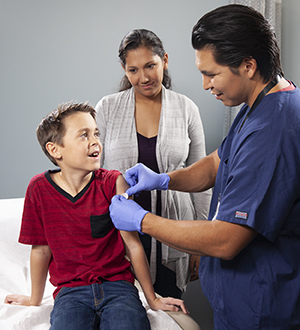Measles
Measles

Who is at risk for measles?
Those most at risk for measles are:
Children and adults who never received the measles vaccine
Infants too young to receive the vaccine (under 1 year of age)
People with weak immune systems, even if they’ve been vaccinated against measles
Adults born in 1957 or later who are not known to be immune to measles
What are the symptoms of measles?
Early symptoms of measles include:
Runny nose
Cough
Inflammation and redness of covering of the eye (conjunctivitis)
Fever
Tiny white spots inside the mouth (Koplik spots)
The red spots of the measles rash appear 2 to 4 days later. The rash often starts on the face and then spreads to the rest of the body.
How is measles diagnosed?
Your healthcare provider can diagnose measles based on the signs and symptoms. Lab tests are used to identify the virus.
How is measles treated?
Vitamin A is used to treat measles in children. It lessens the chance of serious complications and death. Other treatment includes:
Keeping your child away from other people
Medicine for fever
Antibiotic medicine for bacterial infections if they develop
Hospitalization if complications develop
What are the complications of measles?
Most children recover with no lasting effects. But measles can lead to serious complications or even death. Complications of measles include the following:
Middle ear infection
Infection of the lungs (pneumonia)
Infection of the upper airway with trouble breathing and cough (croup)
Diarrhea
Infection of the brain (encephalitis)
How can measles be prevented?
The measles vaccine is part of the routine immunizations recommended for children. Children should be vaccinated for measles with 2 doses:
First dose at 12 to 15 months of age
Second dose at 4 to 6 years of age
For persons who have not been vaccinated, vaccination up to 3 days after exposure to measles may prevent or decrease the severity of the disease.
When to call the healthcare provider
Call your child's healthcare provider right away if you suspect measles. Get emergency care if your child has:
A fever higher than 105°F (40.5°C)
Trouble breathing
A severe headache
Confusion or clumsiness
Updated:
August 04, 2018
Sources:
Measles: Clinical manifestations, diagnosis, treatment and prevention, UpToDate
Reviewed By:
Fetterman, Anne, RN, BSN,Image reviewed by StayWell art team.,Lentnek, Arnold, MD